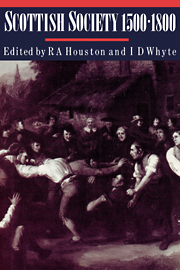Book contents
- Frontmatter
- Contents
- List of tables
- Notes on contributors
- List of abbreviations
- Introduction: Scottish society in perspective
- 1 Population mobility in early modern Scotland
- 2 Scottish food and Scottish history, 1500–1800
- 3 Continuity and change in urban society, 1500–1700
- 4 Women in the economy and society of Scotland, 1500–1800
- 5 Social responses to agrarian ‘improvement’: the Highland and Lowland clearances in Scotland
- 6 ‘Pretense of blude’ and ‘place of thair dwelling’: the nature of highland clans, 1500–1745
- 7 North and south: the development of the gulf in Poor Law practice
- 8 Scotland and Ireland, 1600–1800: their role in the evolution of British society
- 9 Kindred adjoining kingdoms: an English perspective on the social and economic history of early modern Scotland
- Bibliography of printed sources and secondary works
- Index
4 - Women in the economy and society of Scotland, 1500–1800
Published online by Cambridge University Press: 08 March 2010
- Frontmatter
- Contents
- List of tables
- Notes on contributors
- List of abbreviations
- Introduction: Scottish society in perspective
- 1 Population mobility in early modern Scotland
- 2 Scottish food and Scottish history, 1500–1800
- 3 Continuity and change in urban society, 1500–1700
- 4 Women in the economy and society of Scotland, 1500–1800
- 5 Social responses to agrarian ‘improvement’: the Highland and Lowland clearances in Scotland
- 6 ‘Pretense of blude’ and ‘place of thair dwelling’: the nature of highland clans, 1500–1745
- 7 North and south: the development of the gulf in Poor Law practice
- 8 Scotland and Ireland, 1600–1800: their role in the evolution of British society
- 9 Kindred adjoining kingdoms: an English perspective on the social and economic history of early modern Scotland
- Bibliography of printed sources and secondary works
- Index
Summary
INTRODUCTION
More than half the population of early modern Scotland was female. Nevertheless, the status of women in sixteenth-, seventeenth- and eighteenth-century society remains obscure. Often omitted entirely from accounts of the period, women are commonly treated as peripheral and unimportant. Even recent research offers only brief asides about their place in social and economic life. Attempts to render women more visible have concentrated on prominent but atypical members of the upper classes or have simply described women's subordination. This chapter examines the economic, legal, political and cultural status of women in Scottish society between c.1500 and c.1800, concentrating on the middling and lower ranks. The analysis rests on three premises. First, we must understand the common experiences of men and women, more clearly to appreciate those which are distinctive to one gender. This essay seeks to add women to Scottish history, to look at their experience in a predominantly masculine rendering of historical discourse. Despite the presence of certain shared understandings, there is no uniform ‘women's experience’ except at the most reductionist level.
Second, the neglect of women in historiography is partly attributable to the lack of documentation on their lives. Women's experiences are subsumed in those of men. Most analyses try, perhaps inevitably, to fit women into the categories and value systems of a society defined by men. The areas in which women functioned and their status appear principally to have been determined by men. Some of the problems of lack of evidence are insuperable.
- Type
- Chapter
- Information
- Scottish Society, 1500–1800 , pp. 118 - 147Publisher: Cambridge University PressPrint publication year: 1989
- 7
- Cited by

